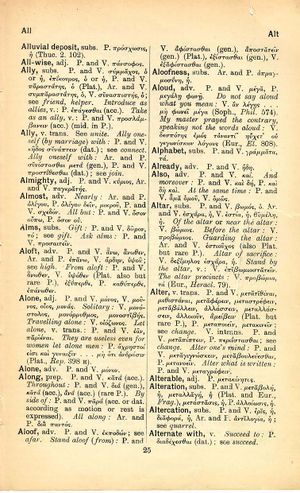altar: Difference between revisions
From LSJ
Ἱκανῶς βιώσεις γηροβοσκῶν τοὺς γονεῖς → Senes parentes qui fovet, vivet diu → Hinlänglich lebst du, wenn du greise Eltern pflegst
(1) |
(1) |
||
| Line 28: | Line 28: | ||
{{esel | {{esel | ||
|sltx=[[ἀρίς]], [[βῆμα]], [[βουνός]] | |sltx=[[ἀρίς]], [[βῆμα]], [[βουνός]] | ||
}} | |||
{{LaEn | |||
|lnetxt=altar altaris N N :: altar, fittings for burnt offerings; burnt offerings; high altar | |||
}} | }} | ||
Revision as of 22:50, 27 February 2019
English > Greek (Woodhouse)
subs.
P. and V. βωμός, ὁ. Ar. and V. ἐσχάρα, ἡ, V. ἑστία, ἡ, θυμέλη, ἡ.
Of the altar or near the altar: V. βώμιος.
Before the allar: V. προβώμιος.
Guarding the altar: Ar. and V. ἑστιοῦχος (also Plat. but rare P.).
Altar of sacrifice: V. δεξίμηλος ἐσχάρα, ἡ.
Stand by the altar, v.: V. ἐπιβωμιοστατεῖν.
The altar precincts: V. προβώμια, τά (Eur., Heracl. 79).
Latin > English (Lewis & Short)
altar: and altāre, āris, n., v. altaria.
Latin > French (Gaffiot 2016)
altar,¹⁰ āris, n., c. altare.
Latin > German (Georges)
altar u. altāre. s. altaria.

